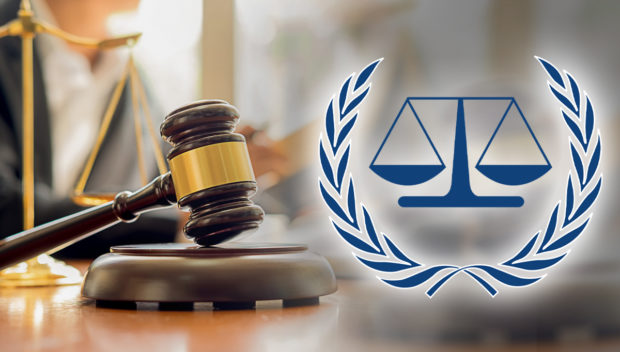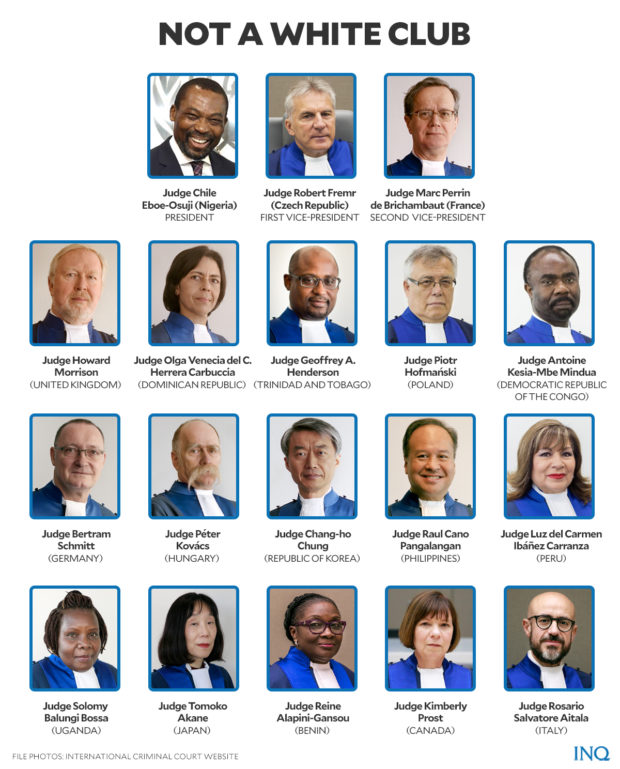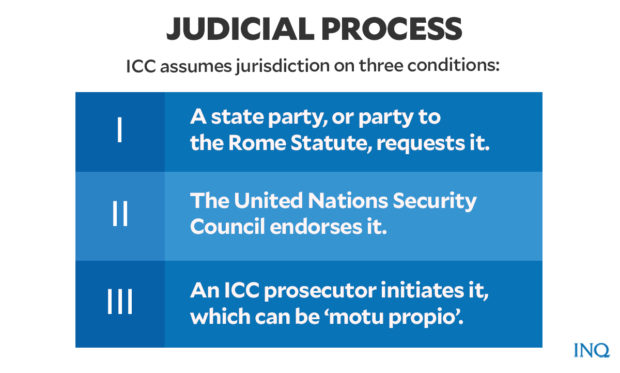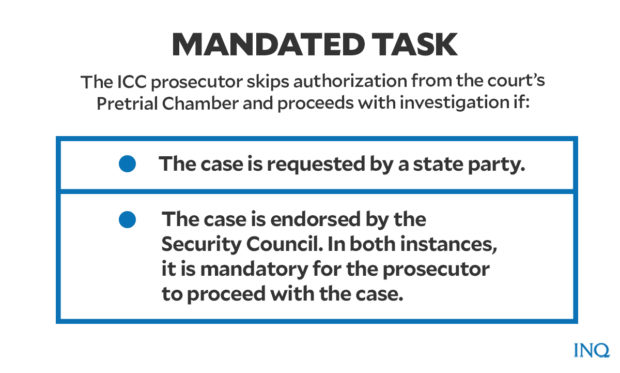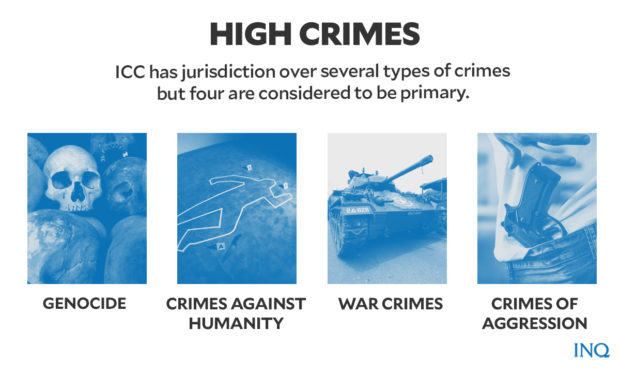ICC is everything but a court of ‘white people’
No, the International Criminal Court (ICC) is not an exclusive club of “white people,” as Philippine President Rodrigo Duterte described it to be.
The list of ICC’s judges would show gender and racially diverse court. These judges and their countries of origin are:
- Judge Chile Eboe-Osuji, the highest officer of the court as president (Nigeria)
- Judge Robert Fremr (Czech Republic)
- Judge Marc Perrin de Brichambaut (France)
- Judge Howard Morrison (UK)
- Judge Olga Venecia del C. Herrera Carbuccia (Dominican Republic)
- Judge Geoffrey A. Henderson (Trinidad and Tobago)
- Judge Piotr Hofmanski (Poland)
- Judge Antoine Kesia-Mbe Mindua (Democratic Republic of the Congo)
- Judge Bertram Schmitt (Germany)
- Judge Peter Kovács (Hungary)
- Judge Chang-ho Chung (South Korea)
- Judge Raul Cano Pangalangan (Philippines)
- Judge Luz del Carmen Ibañez (Peru)
- Judge Sofomy Balungi Bossa (Uganda)
- Judge Tomoka Akane (Japan)
- Judge Reine Alapini-Gansou (Benin)
- Judge Kimberly Prost (Canada)
- Judge Rosario Salvatore Aitala (Italy)
Whoever is advising Duterte about the ICC should know that 10 of the 18 judges, including the highest-ranking officer of the court, are not whites or Caucasians.
It was unclear where he gets his information but the Philippine ruler’s latest rant against ICC last Monday (June 21) was swimming in inaccuracies or downright lies about the international court based in The Hague.
Duterte said that an investigation or prosecution by the ICC based on his administration’s record on the campaign against drugs, or based on allegations made against him, would be akin to allowing the Philippines to turn into a narco-state like Mexico.
Duterte may have a point when he described Mexico as a narco-state because of the government’s apparent failure in fighting drug cartels.
In any case, arguing that ICC is investigating Duterte or intends to prosecute him for wanting to have the Philippines become like Mexico is either ridiculous or does not make sense. As opposed to investigating and prosecuting states for enforcing laws, the ICC examines and prosecutes their leaders for taking part in unlawful killings.
According to the website of the Council of Foreign Relations (CFR), the concept of a global criminal court originated after World War II, when the Allies established the world’s first international war crimes tribunal, known as the Nuremberg Trials, to prosecute Nazi war criminals.
In the 1990s, CFR said on its website, many governments supported the idea of creating a permanent court to hold to account those who commit the world’s most serious crimes.
Earlier, United Nations formed an ad hoc, or temporary, international crime tribunal to try those responsible for mass murders and other crimes in the former Yugoslavia and Rwanda. These were, however, considered inefficient and inadequate deterrents to the world’s most horrific crimes.
The push for what would eventually become the ICC came from Trinidad and Tobago, a small oil-producing South American country, in 1989. In succeeding years, support grew from Europe and Africa for a permanent court, which is now ICC.
ICC came into operation on July 1, 2002, the same day of effectivity of the Rome Statute, a multilateral or multi-nation, treaty that serves as the court’s founding and governing document.
In December 2020, ICC had at least 123 member states. These included the Philippines until, in 2018, Duterte announced he was pulling the country out of the Rome Statute, which was to take effect in 2019, hoping it strips ICC of jurisdiction over him.
The move came after allegations reached ICC about thousands of extrajudicial killings in the Philippines related to the enforcement of Duterte’s biggest election campaign promise—to rid the Philippines of the drug menace or at least reduce those responsible to a bloody pulp.
Although Duterte has not denied his anti-drug campaign has turned bloody, he has remained firm in his belief that his campaign is justified.
During his Monday night rant, Duterte said while he was not admitting that government forces were killing drug suspects, the killings become necessary because “they fight back.”
Duterte viewed the entry of the ICC into the picture as a form of interference with his objective to weaken, if not decapitate, the drug monster.
“So this ICC, this is bullshit,” Duterte said in his latest rant. “Why would I defend or face an accusation before the white people? You must be crazy!”
In what appeared to be an unrelated narrative, the Philippine ruler brought up what he said were “sins” of colonizers in the past. Although he did not say it categorically, it sounded like he was taking ICC to task for not prosecuting these sins, which had been committed centuries ago.
“The colonizers in the past, they have not atoned for their sins against the countries that they invaded, including the Philippines,” Duterte said. “Now they’re trying to set up a court outside our country and making us liable, to face them,” he said, referring to ICC, which was not being set up but is already set up.
“Our laws are different. Our criminal procedures are different,” Duterte said of ICC. He is correct, though. ICC does not operate based on the laws of its member countries and its focus is on the most heinous crimes committed against entire populations.
“How are you supposed to know about these goddamn laws, these laws of the ICC?” Duterte said. “Now, I am supposed to face whites. Leche kayo (Damn you),” the Philippine ruler said.
“I would readily face a court, being accused in a Philippine court, before a Filipino judge,” Duterte said. He is correct in saying that because ICC jurisdiction does not apply when judicial processes in the country where the alleged criminal resides are fully functioning.
ICC, according to the court’s website, “is intended to complement existing national judicial systems and it may therefore exercise jurisdiction only when national courts are unwilling or unable to prosecute criminals.”
According to the Constitution, in the Philippines, no criminal case may be prosecuted or tried against a sitting President.
The Philippine government’s own Commission on Human Rights and human rights groups are pinning the killings of thousands of drug suspects squarely on the government and pointing a finger at Duterte’s own words. But legally, these remained to be allegations that Duterte repeatedly dismissed as worthless human rights noise.
ICC’s Office of the Prosecutor currently has 12 ongoing official investigations and nine preliminary examinations, according to the ICC website.
So far, 45 individuals had been indicted for crimes against humanity. These included three leaders of African nations:
Uhuru Kenyatta, president of Kenya who is facing charges for the killing of 1,300 people during elections in 2007 in his country
Omar al-Bashir, former president of Sudan, for genocide-related to a cleansing campaign against the country’s three main ethnic groups
Laurent Gbagbo, former president of Ivory Coast, for the killings of 3,000 people in election-related violence
Jean Pierre Bemba, former vice president of the Democratic Republic of Congo, for crimes against humanity
According to the ICC website, while the court may try a host of crimes against entire peoples, there are four primary cases over which it exercises jurisdiction—genocide, crimes against humanity, war crimes and crimes of aggression.
The allegations against Duterte would fall under crimes against humanity, defined as acts committed on purpose “as part of widespread or systematic policy directed against civilians in times of war or peace.”
Crimes under the crimes against humanity classification included murder, extermination, torture, persecution and enforced disappearances of persons.
One of the more interesting ICC rules is the absence of a statute of limitations in filing cases. This means that criminals could be held accountable no matter how long it takes, as long as they’re alive or even if they are in their advanced ages.
“The court is participating in a global fight to end impunity,” ICC said on its website.
“Through international criminal justice, the court aims to hold those responsible accountable for their crimes and to help prevent these crimes from happening again,” ICC said.
